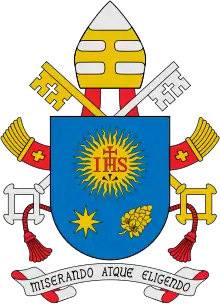| Episcopalis communio Latin for 'Episcopal Communion' Apostolic constitution of Pope Francis | |
|---|---|
 | |
| Signature date | 15 September 2018 |
Episcopalis communio (Episcopal Communion) is an apostolic constitution promulgated by Pope Francis on September 15, 2018. It takes note of the various organizations used during the previous Synod of Bishops, and defines that its final document "participates in the ordinary magisterium."[1][2]
Background and publication
Episcopalis communio is presented as the logical implementation of the apostolic exhortation Evangelii gaudium,[3] Francis' programmatic letter for his pontificate,[4][5] where Francis expressed his intention "to profoundly reshape all the ecclesial structures, so that they become more missionary". The synod of bishops must be a means of collegiality and "always become more and more an adequate channel for the evangelization of the present world more than for self-preservation."[6][7] Francis had previously held synods on the family (2014, 2015) and on youth (2018), and promulgated Episcopalis communio after the regional synod on the Pan-Amazon region (2019). Some analysts surmise that the greatest achievement of Francis' papacy may be his creation of a more synodal Catholic church, where synods serve as a platform for open and energetic debate.[8]
Episcopalis communio was signed on September 15 by Pope Francis and promulgated three days later.[2][9] According to Cardinal Lorenzo Baldisseri, this date recalls the creation of the Synod of Bishops in 1965 by Pope Paul VI.[7]
Content
According to the secretary of the synod council Fabio Fabene, one of the main characteristics of synods under Francis is "to listen as much as possible to reality and people," with in particular the organization of preliminary inquiries. The new constitution provides for the laity to send their contributions directly to the synod's secretary general.[9] The document also specifies the work which must be carried out after the synod, and provides for the possibility of a pre-synodal meeting as for the synod of bishops on Young People, Faith, and Vocational Discernment.[10][11] The constitution states that "If the Roman Pontiff has granted deliberative power to the Synod Assembly, [...] the Final Document participates in the Ordinary Magisterium of the Successor of Peter once it has been ratified and promulgated by him."[12][2]
References
- ↑ "Episcopalis communio (15 September 2018) | Francis". www.vatican.va. Retrieved 2020-02-05.
- 1 2 3 Pantin, Edward (September 18, 2018). "Pope Francis Boosts Authority of the Synod of Bishops". National Catholic Register. Retrieved 21 May 2019.
- ↑ Evangelii Gaudium, §26
- ↑ "Francis: This is how the joy of the Gospel can reform the Church". LaStampa.it. 26 November 2013. Retrieved 2017-06-07.
- ↑ Pope Francis (24 November 2013). "Evangelii Gaudium: Apostolic Exhortation on the Proclamation of the Gospel in Today's World". Vatican. Opening paragraph. Retrieved 2017-06-07.
- ↑ Evangelii Gaudium, §27.
- 1 2 "Baldisseri: una "rifondazione" dell'organismo sinodale". lastampa.it (in Italian). 2018-09-18. Retrieved 2021-02-09.
- ↑ Mitchell, Charlotte. "Pope Francis, everyman pontiff: Profile". www.aljazeera.com. Retrieved 2020-02-05.
- 1 2 Brockhaus, Hannah (18 September 2018). "Pope Francis approves new constitution for Synod of Bishops". Catholic News Agency. Retrieved 21 May 2019.
- ↑ "Le pape François renforce le pouvoir du Synode des évêques". La Croix (in French). 2018-09-18. ISSN 0242-6056. Retrieved 2021-02-09.
- ↑ "Cambia il Sinodo dei vescovi, più spazio all'ascolto dei fedeli". lastampa.it (in Italian). 2018-09-18. Retrieved 2021-02-09.
- ↑ "Episcopalis communio, 18, §2". www.vatican.va. Retrieved 2020-02-05.
External links
- "Episcopalis communio (15 September 2018) | Francis". www.vatican.va. Retrieved 2021-02-09.